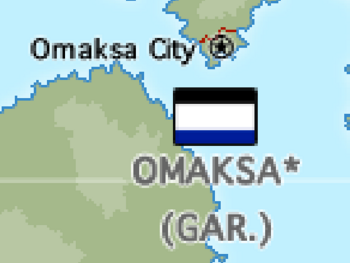Ómaksa
Federal Republic of Ómaksa Sambandslýðveldið Ómaksa Omaksā Federācija Republīki Федеративная Республика Омакса | |
|---|---|
|
Flag | |
| Motto: Pakkajs, Dēiws, be Republīki (Peace, God, and Republic) | |
 Map of Ómaksa | |
| Capital | Ómaksa City |
| Largest city | |
| Recognised national languages | Pilkinin Götaish Garindian |
| Ethnic groups | 40% Pilkininkai 38% Gotneskan 22% Garindinan |
| Religion | |
| Demonym(s) | Ómaksan |
| Government | Parliamentary Republic |
• President | Tomas Būga |
• Vice President | Fyodor Vinogradov |
• Prime Minister | Crístíona Asgaill |
• Speaker of Parliament | Ólöf Kristjánsson |
| Legislature | Seimīns |
| Independent State | |
• Granted Independence by Goutian Empire | 22 June 1938 |
| Area | |
• | 2,446 km2 (944 sq mi) |
| Population | |
• Estimate | 1,420,112 |
• Density | 548.3/km2 (1,420.1/sq mi) |
| GDP (nominal) | estimate |
• Total | 158.62 billion |
• Per capita | 113,300 |
| Gini | Error: Invalid Gini value |
| HDI | Error: Invalid HDI value |
• Summer (DST) | CST -4 |
| Date format | dd-mm-yyyy (AD) |
| Driving side | right |
| Calling code | +65 |
| Internet TLD | .om |
Ómaksa, or formally the Federal Republic of Ómaksa is a small sovereign nation on the Pilezeme Peninsula, in southern Argis. Ómaksa is a small, hilly coastal nation that relies on its strategic position for its trade based economy. Ómaksa borders ___ to the North and the Keelpijp to the south.
Ómaksa is classified as a parliamentary Republic. The political capital and largest city of Ómaksa is Ómaksa City. The Ómaksan head of state is Tomas Būga. Ómaksa started off as a Garindinan colony in 1709, after a couple of merchants accidentally landed ashore and settled there. After the Garindinan-Gotneskan War (1837-1839) came to an end, Ómaksa was transferred over to Gotneska.
Today, Ómaksa is a thriving nation with a diverse economy and a rich cultural heritage. Its strategic location on the Pilezeme Peninsula has allowed it to develop a strong trade-based economy, leveraging its coastal resources and access to international shipping routes.
Etymology
The name of Ómaksa comes from the Gelticization of the name 'Omska' during the Gotneskan colonization. The name Omska comes from Garidinan colonization, Omska was named after the founder of the colony, a famous merchant named Vladimir Omskov.
Geography
- Ómaksa is a small, hilly coastal nation.
- Area: 2,590 km2 (1,000 sq mi)
- Ómaksa borders ___ to the North and the Keelpijp to the south.
- The political capital and largest city of Ómaksa is Ómaksa City.
- Flora and fauna
History
- Origin of people
- Ómaksa started off as a Garindinan colony in 1609, after a couple of merchants accidentally landed ashore and settled there. After the Garindinan-Gotneskan War (1837-1839) came to an end, Ómaksa was transferred over to Gotneska.
Politics
Government
Ómaksa is classified as a parliamentary democracy.
Central Government
Executive
WIP
Parliment
WIP
Judicial
WIP
Military
wip
Economy
wip
Banking
wip
Tourism
wip
Trade
wip
Demographics
Ethnics
WIP
Religion
WIP
Culture
Cuisine
wip
Language
wip
National Holidays
wip
